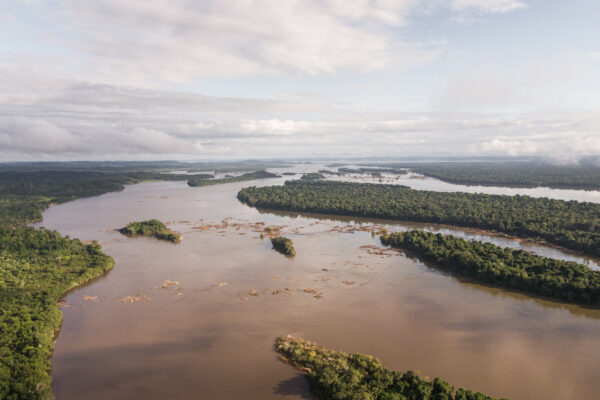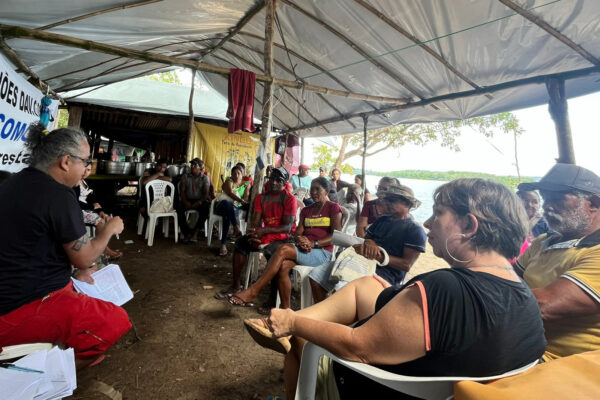Lima, Peru – Environmental and human rights organizations today warned the Inter-American Development Bank (IDB) that the Bank’s process for conducting an “independent audit” of the problematic Camisea gas project, the Bank’s flagship project in Peru is marred by conflicts of interest and lacks independence. The groups criticized the role of the IDB’s Private Sector Department – the IDB unit responsible for the project– in the procurement and preparation of an audit of the project, and they called for an impartial third-party to assist with development and oversight of the audit.
Camisea has been a running controversy ever since the project broke ground in 2001. Its upstream infrastructure is located in one of the most biodiverse rainforests anywhere in the world. Three of its planned four drilling platforms are inside a state reserve for some of the Amazon’s last indigenous peoples living in isolation.
Meanwhile, the pipeline carrying Camisea’s gas and gas liquids to Peru’s Pacific coast has ruptured five times in the first 18 months of operation and lacked adequate geotechnical studies that might have prevented the massive erosion that has plagued the pipeline route. Local communities in this once-pristine Amazon rainforest in Peru say they have seen the local fish and wildlife populations on which they depend plummet– and that there have been numerous other health, economic and environmental problems associated with Camisea.
Now, seventeen environmental and human rights organizations from Peru and the USA have written to IDB President Luis Alberto Moreno warning of a lack of political will to involve “institutions of recognized prestige and impartiality,” such as Netherlands Commission for Environmental Impact Assessment, that could have helped restore credibility to the process and provided a way out of the current controversy. Groups are also dismayed that, although Moreno made a public commitment in April to await the results of the independent audit, the bank is moving ahead with the due diligence process for an additional $400 million of financing from the US and other IDB member nations for the second phase of the project.
The organizations are critical of the fact that preparation and procurement of the audit has been led by the IDB’s Private Sector Department, which is the IDB unit that handled the project and whose failure to make good on environmental and social commitments is at issue. In the letter, the seventeen organizations warn that the framework under which the audit is being elaborated lacks independence and is “inadequate and counterproductive.”
They say the Bank has not made a good faith effort to enlist the assistance of respected and transparent international entities such as the Netherlands Commission for Environmental Assessment, which is associated with the Dutch government and has helped the World Bank with independent assessments of similar projects.
The letter to the IDB comes as a new technical report on the Camisea pipeline alleges serious breaches by the TGP, the pipeline consortium which includes Techint, Hunt Oil, and Pluspetrol, of its own technical specifications and of the industry standards to which the companies claimed to be adhering. The report, by engineers from US-based E-Tech International, also raised questions about a separate audit of the pipeline that the Peruvian Government initiated after the fifth pipeline rupture.
Written with the help of four current or former employees of TGP, each with direct experience of the pipeline’s construction, the E-Tech report reveals that one TGP sub-contractor, Gulf Interstate Engineering, warned the consortium in writing in June 2003 that it was violating its own specifications and industry standards by using unqualified welders.
The E-Tech report also found that:
* The original pipeline log, required on all pipeline construction projects, was incomplete for a section of the natural gas pipeline that E-Tech obtained, lacking key information about welds, welders and radiographs. This document and the testimony of the onsite inspector, clearly shows no geotechnical evaluation was performed prior to construction.
* Another audit initiated by the Peruvian government to investigate these and other allegations related to the physical integrity of the pipeline has been restricted by a government-appointed commission and is not planning on examining several key issues identified by Peru’s pipeline regulatory agency, OSINERG. The commission that designed the audit is led by the Ministry of Energy and Mines – the agency responsible for promoting and overseeing the Camisea project. The commission chose to eliminate from the audit’s scope several critical elements, including a detailed review of pre-construction geotechnical studies, how piping was stored in the field and the X-rays of each pipeline weld. It also has decided to prevent the auditors from having free rein to conduct onsite verification of data concerning pipeline construction.
* E-Tech’s report recommends that the current audit bidding process, which the Garcia government has inherited from the previous administration that developed Camisea, should be declared void. A new process should take place with a greatly expanded scope, including interviews with TGP employees.
Signatories of the letter to Mr. Moreno are Amazon Watch; Áreas Costeras y Recursos Marinos (ACOREMA); Asociación Civil de Exalumnos Sanmartinianos de Pisco; Asociación Civil Labor; Asociación Peruana para la Conservación de la Naturaleza (APECO); Bank Information Center; Centro para el Desarrollo del Indígena Amazónico (CEDIA); Conservación Internacional / Conservation Internacional; Derecho, Ambiente y Recursos Naturales (DAR); Environmental Defense; Escuela para el Desarrollo; Foro Ciudades para la Vida; Fundación Titanka; Oxfam America; Shinai; Sociedad Nacional del Ambiente (SNA); and WWF Perú.
For the text of the letter to the IDB, visit www.amazonwatch.org
E-Tech International’s report can be downloaded at www.etechinternational.org/projects.htm













